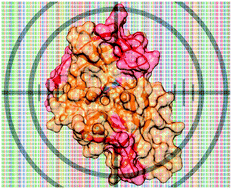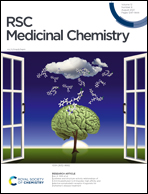Targeting the protease of West Nile virus
Abstract
West Nile virus infections can cause severe neurological symptoms. During the last 25 years, cases have been reported in Asia, North America, Africa, Europe and Australia (Kunjin). No West Nile virus vaccines or specific antiviral therapies are available to date. Various viral proteins and host-cell factors have been evaluated as potential drug targets. The viral protease NS2B–NS3 is among the most promising viral targets. It releases viral proteins from a non-functional polyprotein precursor, making it a critical factor of viral replication. Despite strong efforts, no protease inhibitors have reached clinical trials yet. Substrate-derived peptidomimetics have facilitated structural elucidations of the active protease state, while alternative compounds with increased drug-likeness have recently expanded drug discovery efforts beyond the active site.

- This article is part of the themed collection: Emerging Investigators


 Please wait while we load your content...
Please wait while we load your content...